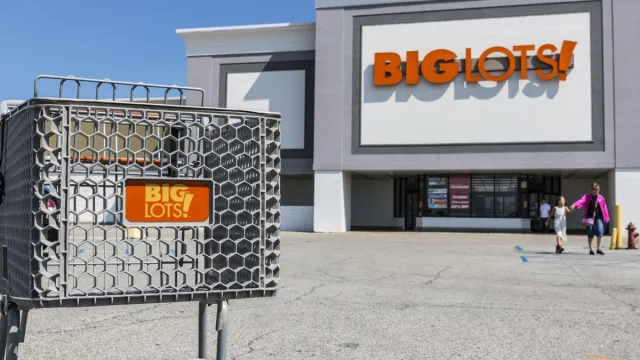Big Lots’ Future Is “Very Concerning,” Experts Warn—Could It Disappear for Good?

From Sears to Kmart, once-giant mass merchandise retailers have struggled to stay afloat over the past decade. Discount chain Big Lots has turned out to be no exception: The retailer closed over 50 stores throughout the U.S. last year, and the closures have continued into 2024. Now, experts are warning that Big Lots’ future is looking “very concerning,” leading some to question if the store could disappear for good.
RELATED: Big Lots Closing More Stores in the Coming Weeks—Here’s Where.
In Dec. 2023, Big Lots reported the 10th consecutive quarter in which its same-store sales had declined. The next financial earnings report will be released on March 7, and will cover the results for its fourth quarter and full 2023 fiscal year.
Big Lots President and CEO Bruce Thorn gave an early look into the company’s performance in a Feb. 12 press release, stating that their fourth quarter results are “in line with [its] guidance on comparable sales, gross margin rate, operating expenses, and inventory.”
Despite this, the company’s stock took a major tumble on Feb. 12, as Loop Capital analyst Anthony Chukumba warned investors to sell. It fell 31 percent to $3.72, which is its largest percentage decrease on record, according to Barron’s.
“We believe Big Lots has lost substantial consumer relevance and mindshare, which in our long experience is very difficult—if not impossible—to regain,” Chukumba wrote in a note to clients, per MarketWatch. He added that he was “skeptical” of the company’s merchandising shift back to bargain and treasure hunting due to changes in the competitive landscape.
Alongside Big Lots’ loss of relevance, Chukumba said the company is also in a “precarious” financial situation. Bloomberg reported on Feb. 9 that the retail chain had been reaching out to banks and investors to obtain new financing amid ongoing losses and declining liquidity, according to unnamed people with knowledge of the company’s plans.
RELATED: 5 Worst Things to Buy at Big Lots, Retail Experts Say.
Last August, the news outlet also reported that Big Lots had started working with consultants AlixPartners LLP for operational help as it tried tackling costs while its revenue continued to shrink.
A few months later, Thorn provided an update on the company’s turnaround efforts in a third quarter earnings call with investors.
“Our trajectory continues to improve and we delivered in the face of the challenging consumer environment,” he claimed at the time.
The CEO also indicated that he believed Big Lots would be able to “return to growth and profitability over time.” But analysts now don’t seem so sure, as the company is not expected to deliver a full year of profitability in fiscal year 2024 or fiscal year 2025, according to SeekingAlpha.
“We think Big Lots’ financial situation is becoming increasingly precarious and find recent media reports the company has hired a turnaround consulting firm and is currently exploring financing options to be very concerning,” Chukumba concluded.
For the time being, Big Lots doesn’t seem to be fully disappearing. The Ohio-based company currently still operates more than 1,400 Big Lots stores throughout 47 states, according to its website. Nevertheless, alarm bells are sounding about its future, which has investors (and shoppers) keeping a close eye on the situation.